
Home Automation and Security for the Macintosh.
Home |
How to order |
Download Page |
Home Automation |
Ideas |
Sand Hill |
Links |
Mail List
A simple toy becomes a useful pocket annunciator
For the deaf, there is no substitute for a vibrating pocket alarm which
can be used to signal all sorts of events from the doorbell to a baby's crying.
For others, it is useful to sometimes have a silent 'pager' which tells only
you of some event or alarm. For example if you have to take medicine at
a certain time, and you don't want to wake your sleeping partner.
We can subscribe to a 'pager' service, and have YoYo send pages about events
while we are not home, but it's pretty slow for announcing events if you're
right there.
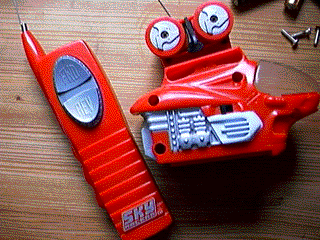
|
Here are the two main parts of a simple toy called the SKY Racer. It costs about
$15 and mainly is a hand-held transmitter with two buttons, and a little motorized
gondola which races around a wire, forward or back, according to the wireless control.
|
The idea is that we want to end up with the transmitter unit connected to our home
automation system so that when we issue a certain X-10 command, a wireless command
will be sent to the receiver in our pocket, and the motor vibrations will be felt.
Since there is a lot of plastic stuff that we don't need in our pocket, let's take
the motor and the receiver and battery compartment out of the surrounding plastic.
Even with the motor, the receiver and batteries are pretty small.
Note that you may want to affix some blob of epoxy etc. to the end of
the motor shaft to make it 'vibrate' more.
Also, you will have to experiment with the antenna, making it less
intrusive by folding it or wrapping it inside the ultimate 'package'.
|
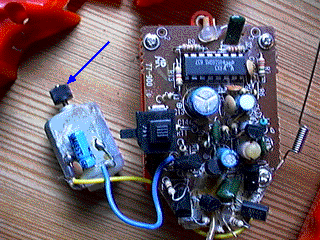
|
Now that looks like a nasty thing to be putting in your pocket, but you
can indeed find a prettier plastic box that will house the whole thing
and make it convenient and confortable.
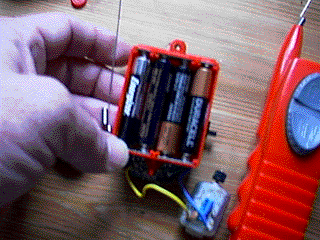
|
Here's the size of the whole thing in perspective:
You carry around only the parts on the left. The transmitter on the right
is going to be hidden in some closet.
|
The transmitter isn't really much bigger than the 9v battery !
Remove the screws here and flip the circuit board over to reveal the
underside...below :
|
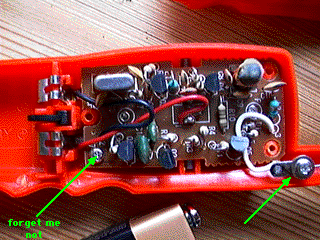
|
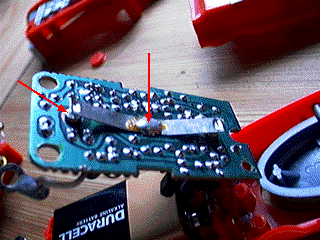
|
All we need to do is attach two wires. One to each side of the
contacts that are shown here.
Then, put the circuit board back down, being careful not to
obstruct the normal push buttons with the new wires.
|
Now bring out the other ends of the two wires, and attach them
to the screw contacts of a Universal Module.
The Universal Module has to be plugged into the wall somewhere,
and the transmitter needs to be placed so that it's antenna is
vertical, and you can get to the unit for maintenance.
|
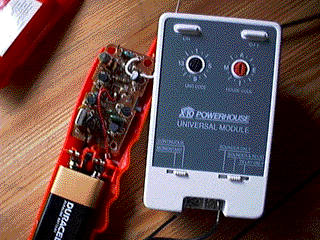
|
Now, all you have to do is send an ON to the Universal Module, anytime
that you want to signal an event. Do be sure that either you set the
Universal Module to 'momentary' mode, OR that you deliberately send
an OFF to it when the alarm has been answered.
Don't forget that you can have two or more 'channels', by purchasing
more of the toys, specifically with separate 'frequencies'. Also, you
can use as many of the receivers as you want, as all will respond to
a single transmitter !
And you might want to have more than one of the hand-held transmitters
lying around. It might be a way to signal someone in the house on demand.
Problems you're going to have
The antennas must be reasonably placed in order to get good signals over
most of your house. Some places may not be good for reception. Know them.
The receiver will sometimes 'jerk' due to radio signals from airplanes, or
even from your wireless telephone. But you should be able to decide that
those were false because they never cause the vibrator to come on continuously.
The batteries will need to be replaced according to use, but I've found that
they seem to last several months in this application.
Copyright 2007, Sand Hill Engineering Inc. All rights reserved.

Last modified: August 28, 2007
Michael Ferguson, webmaster@shed.com








![]()